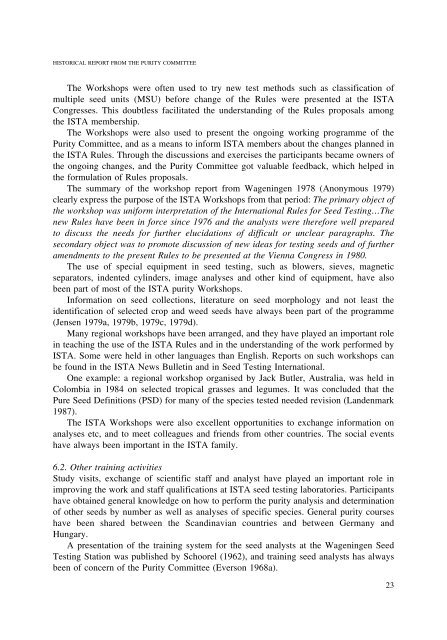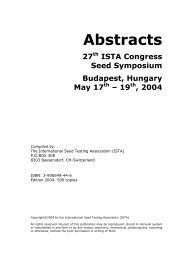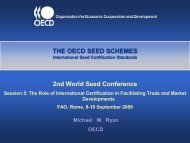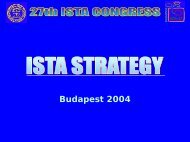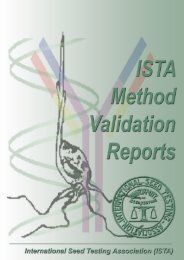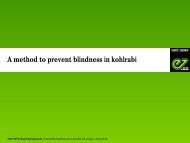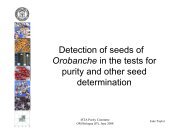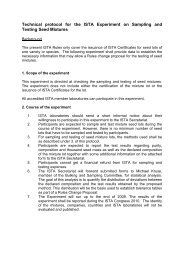Historical Paper - Volume 2 2008 - International Seed Testing ...
Historical Paper - Volume 2 2008 - International Seed Testing ...
Historical Paper - Volume 2 2008 - International Seed Testing ...
You also want an ePaper? Increase the reach of your titles
YUMPU automatically turns print PDFs into web optimized ePapers that Google loves.
HISTORICAL REPORT FROM THE PURITY COMMITTEE<br />
The Workshops were often used to try new test methods such as classification of<br />
multiple seed units (MSU) before change of the Rules were presented at the ISTA<br />
Congresses. This doubtless facilitated the understanding of the Rules proposals among<br />
the ISTA membership.<br />
The Workshops were also used to present the ongoing working programme of the<br />
Purity Committee, and as a means to inform ISTA members about the changes planned in<br />
the ISTA Rules. Through the discussions and exercises the participants became owners of<br />
the ongoing changes, and the Purity Committee got valuable feedback, which helped in<br />
the formulation of Rules proposals.<br />
The summary of the workshop report from Wageningen 1978 (Anonymous 1979)<br />
clearly express the purpose of the ISTA Workshops from that period: The primary object of<br />
the workshop was uniform interpretation of the <strong>International</strong> Rules for <strong>Seed</strong> <strong>Testing</strong>…The<br />
new Rules have been in force since 1976 and the analysts were therefore well prepared<br />
to discuss the needs for further elucidations of difficult or unclear paragraphs. The<br />
secondary object was to promote discussion of new ideas for testing seeds and of further<br />
amendments to the present Rules to be presented at the Vienna Congress in 1980.<br />
The use of special equipment in seed testing, such as blowers, sieves, magnetic<br />
separators, indented cylinders, image analyses and other kind of equipment, have also<br />
been part of most of the ISTA purity Workshops.<br />
Information on seed collections, literature on seed morphology and not least the<br />
identification of selected crop and weed seeds have always been part of the programme<br />
(Jensen 1979a, 1979b, 1979c, 1979d).<br />
Many regional workshops have been arranged, and they have played an important role<br />
in teaching the use of the ISTA Rules and in the understanding of the work performed by<br />
ISTA. Some were held in other languages than English. Reports on such workshops can<br />
be found in the ISTA News Bulletin and in <strong>Seed</strong> <strong>Testing</strong> <strong>International</strong>.<br />
One example: a regional workshop organised by Jack Butler, Australia, was held in<br />
Colombia in 1984 on selected tropical grasses and legumes. It was concluded that the<br />
Pure <strong>Seed</strong> Definitions (PSD) for many of the species tested needed revision (Landenmark<br />
1987).<br />
The ISTA Workshops were also excellent opportunities to exchange information on<br />
analyses etc, and to meet colleagues and friends from other countries. The social events<br />
have always been important in the ISTA family.<br />
6.2. Other training activities<br />
Study visits, exchange of scientific staff and analyst have played an important role in<br />
improving the work and staff qualifications at ISTA seed testing laboratories. Participants<br />
have obtained general knowledge on how to perform the purity analysis and determination<br />
of other seeds by number as well as analyses of specific species. General purity courses<br />
have been shared between the Scandinavian countries and between Germany and<br />
Hungary.<br />
A presentation of the training system for the seed analysts at the Wageningen <strong>Seed</strong><br />
<strong>Testing</strong> Station was published by Schoorel (1962), and training seed analysts has always<br />
been of concern of the Purity Committee (Everson 1968a).<br />
23


